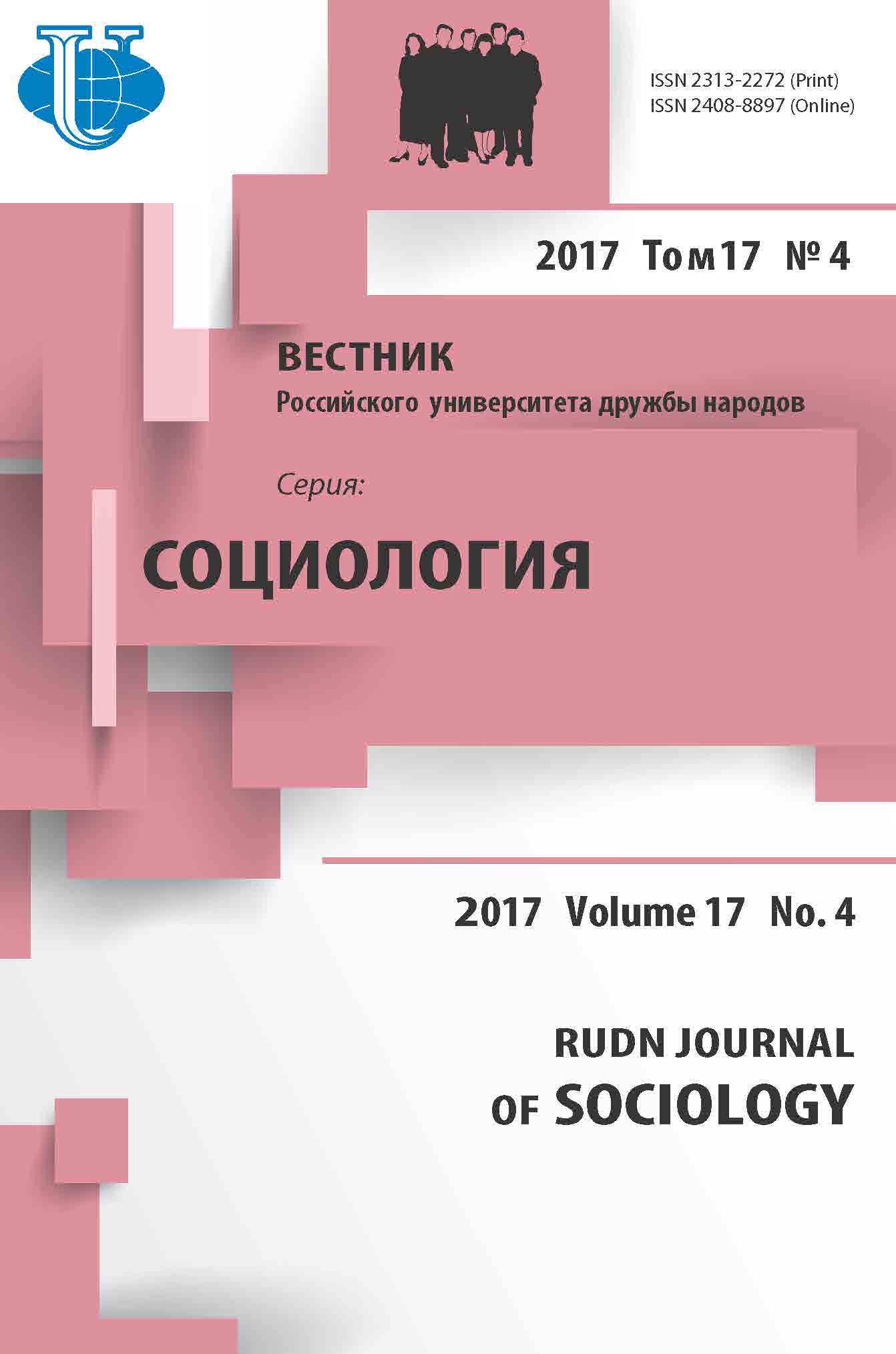“NEW CATASTROPHISM” AND THE FUTURE: THE DEMAND FOR NON-LINEAR KNOWLEDGE
- Authors: Kravchenko SA1, Perova AE1
-
Affiliations:
- Moscow State Institute of International Relations (MGIMO University)
- Issue: Vol 17, No 4 (2017)
- Pages: 449-459
- Section: Theory, Methodology and History of Sociological Research
- URL: https://journals.rudn.ru/sociology/article/view/17287
- DOI: https://doi.org/10.22363/2313-2272-2017-17-4-449-459
Cite item
Full Text
Abstract
The article analyzes the phenomenon of ‘new’ catastrophes determined by the specifics of contemporary vulnerabilities, i.e. the growing structural dysfunction of the complex system of society and/or techno-natural system. The authors show that this dysfunctionality is caused by both human activities and the system’s internal reflexivity; it depends on system’s ability to bear external and internal burdens of emergent and turbulent nature, which implies the uncertainty of catastrophes. The article emphasizes that the majority of ‘new’ disasters manifest in ‘liquid’ forms, which leads to the growth of permanent uncertainties in all spheres of life, while there are obvious limitations in the use of modern scientific knowledge for managing complex vulnerabilities. Many scientific innovations within the paradigm of ‘new catastrophism’ aim to study the emerging social-natural realities to find ways to minimize vulnerabilities. The authors show such ways on the example of new sociological approaches to the analysis of climate changes, ‘dead land’, ‘dead water’, and ‘normal accidents’. The efficiency of such approaches is determined by the integration of social and natural sciences achievements and by interdisciplinary efforts to develop principles of non-linear knowledge. However, the weakness of these approaches is determined by the focus on principles of formalism and pragmatism that limit the potential of the humanities. The authors call for a humanistic turn that would combine scientific, social and humanitarian knowledge, and allow to over-come ideology and practices of anthropocentrism so as to ensure a new humanism necessary to minimize consequences of ‘new’ catastrophes and to develop the humanistic strategy for the future.
About the authors
S A Kravchenko
Moscow State Institute of International Relations (MGIMO University)
Email: sociol7@yandex.ru
prosp. Vernadskogo, 76, Moscow, 119454, Russia
A E Perova
Moscow State Institute of International Relations (MGIMO University)
Email: aeperova@yandex.ru
prosp. Vernadskogo, 76, Moscow, 119454, Russia
References
- Bauman Z. Liquid Modernity. Cambridge: Polity Press; 2000.
- Bauman Z. Collateral Damage. Social Inequalities in a Global Age. Cambridge; 2011.
- Bauman Z. Liquid Fear. Cambridge; 2006.
- Beck U. The Metamorphosis of the World. Cambridge; 2016.
- Beck U. World at Risk. Cambridge; 2010.
- Brunsma D.L., Overfelt D., Picou J.S. (eds). The Sociology of Katrina. Perspectives on a Modern Catastrophe. Lanham; 2010.
- Castells M. The Rise of the Network Society. Oxford; 2010.
- Foucault M. Arheologija znanija [The Archaeology of Knowledge]. Saint Petersburg, 2004 (In Russ.).
- Foucault M. Of other spaces. Diacritics. 1986; 16 (1).
- Freshwater crisis. http://www.nationalgeographic.com/freshwater/freshwater-crisis.html.
- Giddens A. The Politics of Climate Change. Cambridge; 2009.
- Gorshkov M.K., Petukhov V.V. (ed.). Rossijskoe obshhestvo i vyzovy vremeni [Russian Society and Challenges of the Time]. Moscow; 2017 (In Russ.).
- Hannigan J. Environmental Sociology. London and New York; 2014.
- Hoekstra A.J., Chapagain A.K. Globalization of Water: Sharing the Planet’s Freshwater Resources. Oxford; 2008.
- Kravchenko S.A. Vostrebovannost' gumanisticheskogo povorota v sociologii [The need for the humanistic turn in sociology]. Sociologicheskaja nauka i social'naja praktika, 2013; 1 (In Russ.).
- K ravchenko S.A. Sociologija riska i bezopasnosti [Sociology of Risks and Safety]. Moscow; 2016 (In Russ.).
- Kravchenko S.A., Salygin V.I. Novyj sintez nauchnogo znanija: stanovlenie mezhdisciplinarnoj nauki [A new synthesis of scientific knowledge: The development of interdisciplinary science]. Sociologicheskie issledovanija. 2015; 10 (In Russ.).
- Marriner N., Morhange Ch., Skrimshire S. Geoscience meets the four horsemen? Tracking the rise of neocatastrophism. Global and Planetary Change. 2010; 74 (1).
- Meadows D.H., Meadows D.L., Randers J. Beyond the Limits. Chelsea Green; 1992.
- Mekonnen M., Hoekstra A.Y. Four billion people facing severe water scarcity. Science Advances. 2016; 2 (2).
- Perrow Ch. Normal Accidents: Living with High Risk Technologies. New Brunswick; 1999. [2 2 ] Perrow Ch. The Next Catastrophe: Reducing our Vulnerabilities to Natural, Industrial, and Terrorist Disasters. Princeton University Press; 2011.
- Preston Ch.J. Framing an ethics of climate management for the Anthropocene. Climatic Change. 2015; 130 (3).
- Report of the United Nations Conference on Environment and Development. Rio de Janeiro, 3-14 June 1992. New York; 1993.
- Sassen S. Expulsions: Brutality and Complexity in the Global Economy. Cambridge; 2014.
- Sorokin P.A. Man and Society in Calamity: the Effects of War, Revolution, Famine, Pestilence upon Human Mind, Behavior, Social Organization and Cultural Life. New Brunswick; 2010.
- Thomas D.S.K., Phillips B.D., Lovekamp W.E., Fothergill A. (eds.) Social Vulnerability to Disasters. Boca Raton; 2013.
- Urry J. Climate Change and Society. Malden; 2011.
- Urry J. Global Complexity. Cambridge; 2003.
- World Meteorological Organization Statement on the State of the Global Climate in 2016. http://library.wmo.int/opac/doc_num.php?explnum_id=3414.
- Yanitsky O.N. Ekologicheskie katastrofy: strukturno-funkcionalnyj analiz [Ecological disasters: Structural and functional analysis], http://www.isras.ru/publ.html?id=2794 (In Russ.).
- Yanitsky O.N. Sociobiotehnicheskie sistemy: novyj vzgljad na vzaimodejstvie cheloveka i prirody [Sociobiotechnical systems: A new interpretation of the interaction of man and nature]. Sociologicheskaja nauka i social'naja praktika. 2016; 3 (In Russ.).
- Yanitsky O.N. Sociology of critical areas. Open Journal of Social Science Research. 2014; 2 (3).
- Zarubina N.N., Kravchenko S.A. (eds.) Sociologija pitanija: tradicii i transformacii [Sociology of Food Consumption: Traditions and Transformations]. Moscow; 2017 (In Russ.).














